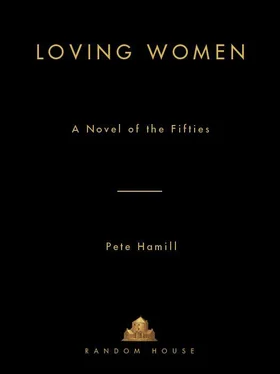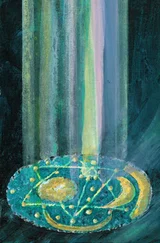“Saturday,” I said. “Please. We can talk about it then. I got about a minute left and then I’m AWOL. Please …”
“Sunday,” she said. There was doubt in her face but she squeezed my hand. “Ten in the morning. We’ll have us a picnic.”
I kissed her on the cheek and sprinted to the gate, showed my Liberty Pass to the guard. He glanced at the clock.
“Playin’ it fine, ain’t you, sailor?”
“Yeah,” I said.
Bolden came over.
“The man’s here, jarhead,” he said. “He don’t need no lectures from you.”
He took my elbow and opened the umbrella and we hurried into the rain, heading for the barracks. I glanced back and saw Eden’s taillights stopped at the highway. Going home. Bolden looked at me and shook his head.
“You are a sly motherfucker, boy,” he said.
That night, with the world sleeping under the Gulf rain, Bobby Bolden took me to the Negro barracks above the mess hall, the great long room that they all called the Kingdom of Darkness. At the near end, inside the door, there were tables and chairs and a four-burner gas stove, pots and pans and dishes and a refrigerator. The bunks and lockers were at the other end. The room was crowded with black sailors and a few Filipinos and loud with music. The close, humid air smelled of frying bacon. Bolden explained that the messcooks had keys to the galley and the food lockers and did their own cooking upstairs. “They work when everyone else eats,” he said, “so they get to eat whenever they want to. Like now.”
There were heavy blackout shades on all the windows and weather stripping on the doors to keep the sound from flying around the base. A big noisy air conditioner filled one window. (“They chipped in f’that,” Bolden said. “Sounds like a C-47, don’t it?”) When I walked in, Freddie Harada looked up from a book and waved hello and went back to his reading (the Philippines only four years into independence and the Huks fighting in the mountains of Luzon while the Navy still treated them like colonial subjects, fit only to be messcooks or valets). Then Bobby Bolden introduced me to the others; there were a lot of oh-yeahs, heard-’bout-yous, so Bolden must have prepared them. I wondered what he’d said about me: The ofay that thinks he knows music, the white boy from New York, the storekeeper with the fresh mouth. But it couldn’t have been too bad. They smiled as we shook hands and I tried to use a mental shorthand, matching physical things against names so if I got the names mixed up they wouldn’t think I believed all Negroes looked alike.
So here was Tampa (red hair, thin arms, a swell of belly) and Lightnin’ (lone gold tooth, short, muscular, trim) and Rhode Island Freddie (big and fat with processed hair and a pencil moustache) and Bumper (thin lips and horn-rimmed glasses) and Little Elroy (bald, huge, a tattoo of a nude woman on his coffee-colored chest). Others were sleeping, drifting around the bunks or out on the town, but this was the basic crew in the Kingdom of Darkness. On that night, as on all the others that followed, Rhode Island Freddie was doing the cooking, his T-shirt very white against his skin, and the others resembled football players in a locker room before a game, jiving, shouting, saying terrible things about one another’s mothers and moving, consciously or not, and sometimes sitting down, to the music. A singer named Lloyd Price was calling:
Lawdy lawdy lawdy
Miz Clawdy …
And they were singing the chorus with him while I was handed a beer and a plate of bacon and eggs — I no longer felt gorged with gumbo; emptied, in fact, by what happened after — and Freddie Harada came down to me and asked how I was feeling and I said great, great (the smell of sex on me too, but nobody here knew except Bolden) and Rhode Island Freddie asked me did I ever go to Minton’s Playhouse in Harlem and I said no, never been there, wasn’t old enough, but I’d hung out on 52d Street, I’d heard Tatum play piano through the open doors of the Club Ibis and saw Billie Holiday once coming out of a limousine (with a white guy, but I didn’t say that) and then I looked up and Bobby Bolden was taking his horn out of its case and Rhode Island Freddie said, Here we go .
Bolden blew honking comments on the Lloyd Price tune (which they played again and then again), making dirty sounds in the lower register, his tone fat and sweaty, everybody singing now, and Bolden playing in and out of the words, Lawdy lawdy lawdy, Miss Clawdy and the record falling again on the thick plug of a 45-rpm player and I finished the beer and someone handed me another one and then the music changed and it was Fats Domino singing Goin home tomorrow. Can’t stand your evil ways … Goin home, tomorrow, Can’t stand your evil ways … (no picture of him in my head, ’cause this was the time of Patti Page and Joni James and Jo Stafford and Johnnie Ray, the last year of Tin Pan Alley, the last year of white-bread American music, the last year before rock ’n’ roll) and then the guy named Bumper said this was some song, black man up north working in some factory , tired of all the bullshit , wants to come home to the South . And Little Elroy laughed and said, “Shit, Bum-puh, I tho’t this was about the muthafuckin Navy !”
While Bobby Bolden played on.
They kept drinking and eating and making a hundred little moves to the music. There was a record called “She Aint Got No Hair” by a group called Professor Longhair and the Shufflin Hungarians (“He puttin on the world, man,” said Tampa. “Fess ain’t no fuckin Hungarian, he just a nigger lak us”) and a tune by Roy Brown and his Mighty Mighty Men called “Good Rockin’ Tonight” and another one, same guy, “Cadillac Baby,” and a sad, wailing, heartbroken song called “Trouble at Midnight.” I remember feeling instantly changed, the way I’d felt with Eden in the trailer; I was one Michael Devlin before and another Michael Devlin afterward. I’d never heard this music before; it was all about balling, drinking and fucking up and it worked off a back beat of some kind, not 4/4 time or the kinds of mixed tempos the beboppers played on Symphony Sid. “Don’t Roll Them Bloodshot Eyes at Me” another guy was shouting (Wynonie Harris, but I didn’t know that then), while Bobby Bolden honked, and I opened another beer, feeling like I’d been granted a passport into a different world. Someone brought a steak to Bobby Bolden and he stopped playing. He saw me sitting on the edge of a bunk and came over. The music was thinner without his horn.
He watched Tampa doing a tight, intricate series of steps to an up-tempo honking shouter. I told him I liked the music.
“It sure ain’t Ben Webster, but, you know, it’s alive , man. Party music. Fuck music. Right outta the blues, with a little sound of the church in there too. You gotta hear it in a club. Like in Biloxi, or a place like Macon. Or the Dew Drop Inn over New Orleans … Go to some black joints. Drink some corn likker. Smoke some reefer. Then you really hear it. These records, they don’t get it right. Sound like they playin’ in a field. No bottom. No breath. No feel …”
He leaned back, looking drowsy and satisfied. Fats Domino was playing again. I was trying to absorb what he was saying, to understand it, above all, to remember. And I felt cut off from other parts of my life. Eden. The Navy.
“What’d Red Cannon do if he walked in here?”
“He don’t come here.”
“Why not?”
“Cause we’d eat the mothafucka.”
He laughed.
“I’d pay to see that,” I said.
“Don’t take his shit,” Bobby Bolden said.
Читать дальше












